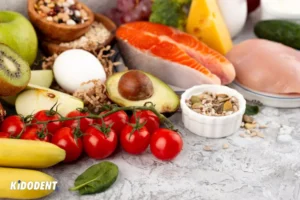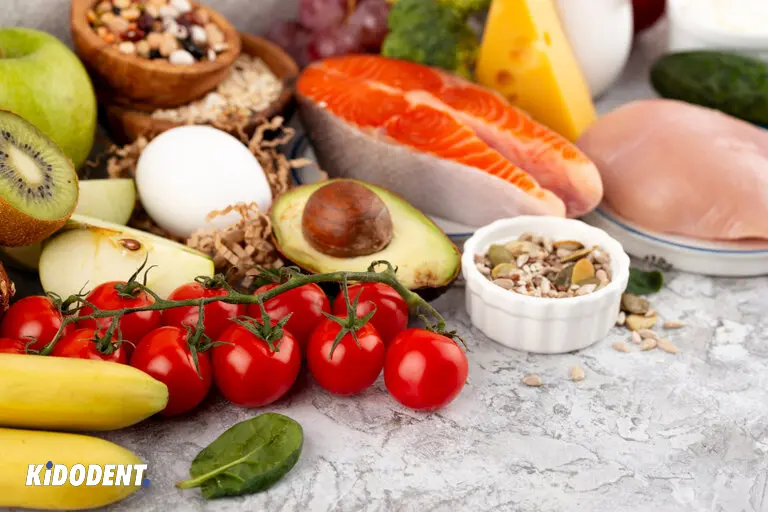Brushing and flossing are essential to maintaining oral health. But did you know that the nutrients you consume or the lack of them can also have a significant impact on your oral health? Your mouth, teeth, and gums are the first points of contact your body has with the foods you eat, and dental health is essential to start the digestion process. Nutrient deficiencies can lead to oral diseases such as inflammation and tooth loss. This means that taking the right vitamins and minerals through foods and supplements can help keep teeth and gums healthy. Keep reading to know the most important vitamins for teeth and gums health.
1. Calcium
Calcium is not just limited to your bones, it is also necessary for the health of your teeth. You may actually be getting some form of calcium in your daily diet right now by consuming dairy products like milk and yogurt, which is easy for your body to absorb.
Calcium is a mineral that everyone knows is good for your bone spur. In fact, tooth enamel is primarily composed of calcium. Therefore, the extra amounts consumed means a strong enamel layer and better prevention of tooth decay.
Some foods containing calcium:
- Dairy products such as milk, yogurt, cheese
- Fortified nuts
- Leafy vegetables (broccoli, kale, bok choy)
- Calcium-fortified orange juice
- Beans and lentils
2. Phosphorus
Phosphorus is another essential mineral for healthy teeth. It helps absorb and use calcium in the body and strengthens teeth by protecting and regenerating tooth enamel. Our body already contains adequate amounts of phosphorus and most of it can be found in the teeth.
Calcium once again comes into play as it works with phosphorus to build and protect tooth enamel. Keep your baby’s teeth and emerging permanent teeth healthy with protein-rich foods that contain phosphorus.
Red meat, eggs, nuts, legumes, whole grains, seafood (such as tuna and salmon), and dairy products are examples of foods in which phosphorous is found.
3. Vitamin D
Vitamin D plays an important role in maintaining the health of your teeth. Because vitamin D plays an important role in bone and tooth mineralization, it is considered as one of the key vitamins for teeth. Vitamin D deficiency can lead to several oral health disorders, such as gingivitis, cavities, and gum disease.
Vitamin D not only increases mineral density, but also helps absorb, transport, and deposit calcium in the bones that support your teeth. This vitamin is an essential vitamin for the absorption of calcium by the body and thus strengthens the teeth.
Oily fish, such as salmon, sardine, herring, and mackerel are the best vitamin D sources. In addition, eggs, beef liver, fortified milk, breakfast cereals, and mushrooms are great to get your vitamin D.
Our body also produces vitamin D naturally when exposed to the sun, so getting some sun outdoors is also beneficial.
4. Vitamin C
Vitamin C is not only good for your teeth, but it is also a great vitamin for your gums. It plays an important role in keeping teeth strong and healthy. Its deficiency can lead to bleeding gums and gum disease. In addition, vitamin C supplements also reduces erosive tooth decay in early childhood and prevent teeth defects like enamel hypoplasia.
Vitamin C helps in the production and repair of collagen—a protein found in connective tissues. Collagen is the main structural protein found in the gums and helps hold the teeth in place by bonding them to the surrounding bone structure. It also helps strengthen tooth enamel to prevent erosion.
Because vitamin C is water-soluble and not stored in the body, it is important to get it from your diet every day. Good sources of vitamin C include citrus fruits, berries, peppers, broccoli, spinach, sweet potatoes, Brussels sprouts, cantaloupe, and oranges.
5. Vitamin A
Vitamin A is great for your mouth, especially your saliva production. Saliva helps break down food and also removes bacteria from between your teeth.
For healthy gum tissue, you need plenty of vitamin A to maintain strong tissue. Your gums may become inflamed or swollen with lack of necessary vitamins for teeth and gums. This irritation can cause the gums to bleed when brushing or flossing. Eating a diet rich in this nutrient can help maintain healthy gums and reduce the risk of gingivitis and other gum problems.
Oranges, carrots, sweet potatoes, bell peppers, fish, egg yolks, spinach, and almonds are just some foods high in vitamin A.
6. Potassium
Like vitamin D, potassium does wonders for your bone mineral density. It also helps the gum tissue heal faster. Bananas are one of the best sources of potassium. Vegetables with dark leaves, potatoes, avocados, dried plums, milk, and cheese are other foods rich in potassium.
Time to take vitamins and minerals
A healthy diet can provide you with plenty of these vitamins and minerals for your teeth and gums. Taking supplements can be an option in some cases. If you want to take a supplement, talk to your dentist or doctor, as some dietary supplements may react or interact with some prescription medications.
If you are concerned about your vitamin levels, talk to your dentist about supplements or foods you can add to your diet. Understanding how these vitamins affect your teeth can help you take care of your mouth and teeth in the long run.
shorten URL
